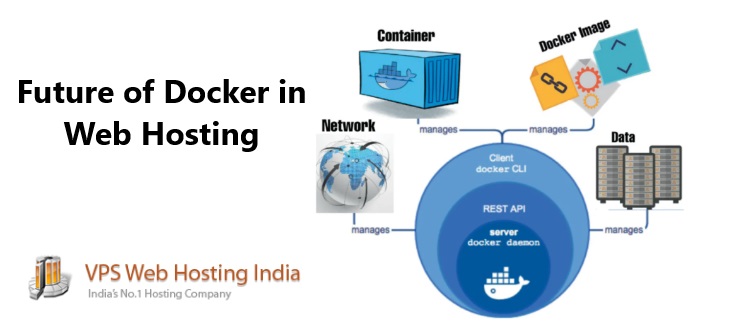Introduction
Future of Docker in Web Hosting – The advent of Docker has revolutionized web hosting, offering unparalleled consistency, scalability, and resource efficiency. As technology evolves, Docker is poised to play an even more significant role in the future of web hosting. In this post, we’ll explore the emerging trends and make predictions about how Docker will shape the future of web hosting.

Table of Contents
1. Increased Adoption of Microservices Architecture
Microservices architecture has already gained traction, and its adoption will only grow. Docker’s lightweight containers are ideal for hosting microservices, enabling developers to run independent components of an application in isolated environments.
Predictions:
- More web hosting providers will offer container-native platforms optimized for microservices.
- Tools integrating Docker and microservices, such as Kubernetes, will become standard in hosting environments.
2. Serverless Computing and Containers
The rise of serverless computing and Function-as-a-Service (FaaS) platforms has introduced new ways to host applications. Docker’s portability and speed make it a natural fit for serverless environments.
Predictions:
- Docker containers will increasingly be used to package and deploy serverless functions.
- Hybrid models combining serverless and containerized workloads will emerge, offering flexibility for various use cases.
3. Edge Computing with Docker
As edge computing gains momentum, Docker containers will become a critical tool for deploying applications closer to end users. Edge environments often require lightweight, portable solutions, which Docker excels at providing.
Predictions:
- Web hosting providers will integrate Docker into edge infrastructure for faster, localized content delivery.
- Dockerized applications will power IoT devices and edge networks, enhancing performance and reducing latency.
4. AI and Machine Learning Workloads in Web Hosting
AI and ML applications are becoming mainstream, and Docker provides an excellent platform for deploying these workloads. Hosting environments are already adapting to support Dockerized AI models and pipelines.

Predictions:
- Web hosting services will offer specialized Docker environments optimized for AI and ML frameworks like TensorFlow and PyTorch.
- Container orchestration tools will evolve to better support GPU-accelerated workloads for AI applications.
5. Enhanced Security Features for Containers
Security is a critical concern in web hosting, and Docker has already introduced features like Docker Content Trust and rootless containers. The future will bring even more robust security enhancements.
Predictions:
- Web hosting platforms will provide advanced container security tools, such as automated vulnerability scanning and encrypted container images.
- AI-driven monitoring tools will detect and mitigate security threats in real-time within Dockerized environments.
6. Deeper Integration with Cloud-Native Tools
Cloud-native development is on the rise, and Docker is central to this ecosystem. Hosting providers will increasingly integrate Docker with cloud-native tools and services to simplify deployment and management.
Predictions:
- Platforms like AWS, Google Cloud, and Azure will expand their Docker support with built-in tools for CI/CD, monitoring, and scaling.
- Hosting services will offer one-click deployment of pre-configured Docker stacks for popular applications.
7. Automation and Self-Healing Systems
Automation is becoming a cornerstone of modern web hosting. Docker, when combined with orchestration tools like Kubernetes, enables automated scaling, updates, and self-healing systems.
Predictions:
- Hosting providers will offer turnkey Docker solutions with built-in automation for deploying, scaling, and managing containers.
- AI-powered orchestration will predict and prevent system failures, automatically redeploying containers as needed.
8. Docker in Hybrid and Multi-Cloud Hosting
The future of web hosting lies in hybrid and multi-cloud strategies, allowing businesses to distribute workloads across multiple providers. Docker’s portability makes it a key enabler of this trend.
Predictions:
- Hosting providers will introduce tools for seamless Docker container migration across cloud platforms.
- Hybrid solutions combining on-premises and cloud-hosted containers will become a standard offering.
9. Lightweight and Specialized Containers
The demand for smaller, faster containers will continue to grow. Initiatives like microVMs and unikernels are already pushing the boundaries of what containers can do.
Predictions:
- Hosting environments will support ultra-lightweight Docker alternatives for specific use cases.
- Containers tailored for specific frameworks or languages will become more common in web hosting.
10. Standardization and Better Developer Tools
As Docker matures, standardization in container management, monitoring, and deployment will increase. Developer tools will also become more accessible and user-friendly.
Predictions:
- Unified standards for Docker image management and container orchestration will emerge.
- Improved graphical interfaces and low-code platforms will make Docker adoption easier for non-technical users.
Conclusion
Docker has already transformed web hosting, but its journey is far from over. From powering microservices and serverless applications to driving edge computing and AI workloads, Docker is set to remain a cornerstone of modern hosting solutions. As web hosting evolves, Docker will continue to adapt, enabling developers and businesses to build, deploy, and scale applications more efficiently than ever.
Whether you’re a developer or a business owner, embracing Docker today will position you at the forefront of tomorrow’s hosting innovations.
Future of Docker in Web Hosting Future of Docker in Web Hosting Future of Docker in Web Hosting Future of Docker in Web Hosting Future of Docker in Web Hosting Future of Docker in Web Hosting Future of Docker in Web Hosting Future of Docker in Web Hosting

